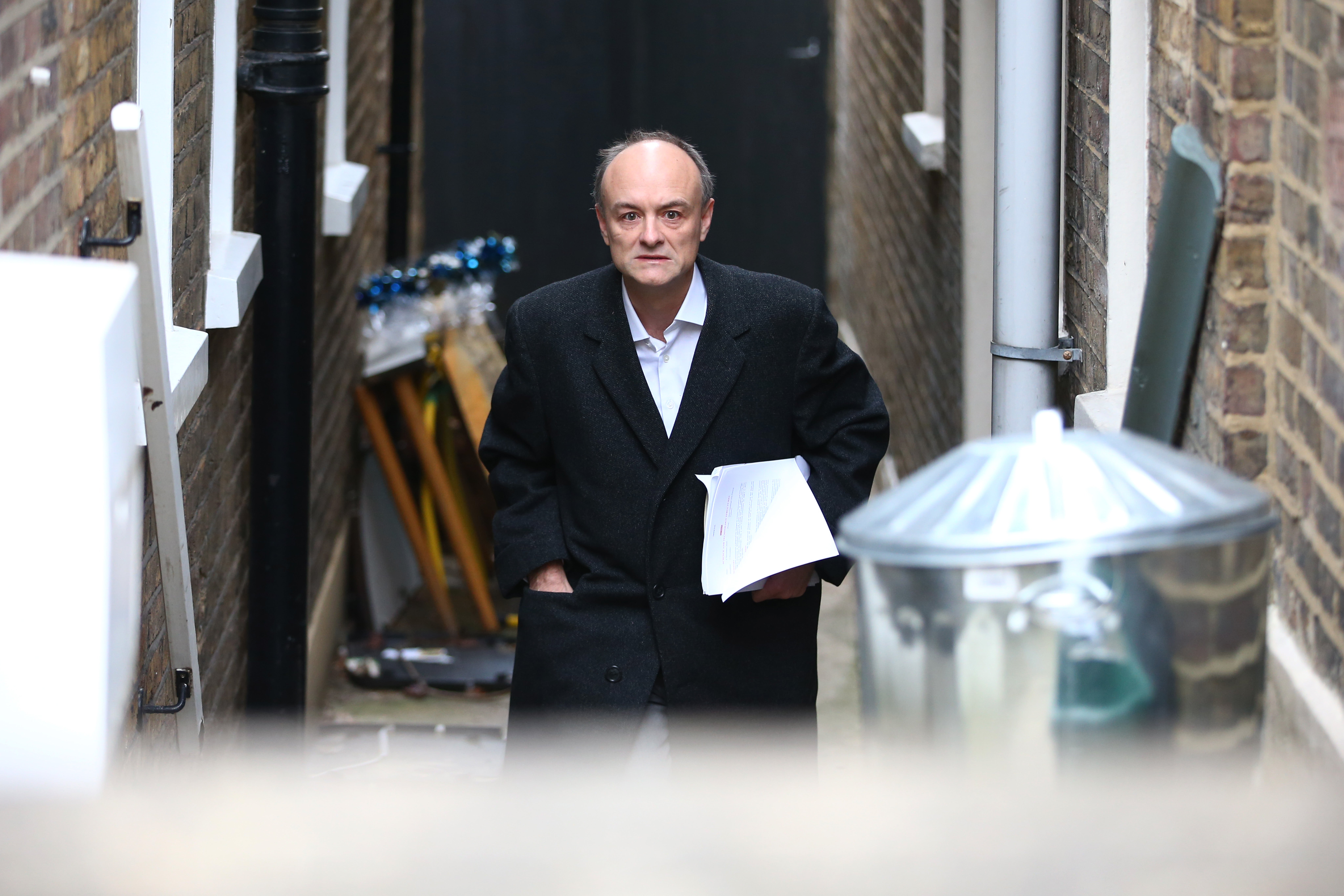Your support helps us to tell the story
From reproductive rights to climate change to Big Tech, The Independent is on the ground when the story is developing. Whether it's investigating the financials of Elon Musk's pro-Trump PAC or producing our latest documentary, 'The A Word', which shines a light on the American women fighting for reproductive rights, we know how important it is to parse out the facts from the messaging.
At such a critical moment in US history, we need reporters on the ground. Your donation allows us to keep sending journalists to speak to both sides of the story.
The Independent is trusted by Americans across the entire political spectrum. And unlike many other quality news outlets, we choose not to lock Americans out of our reporting and analysis with paywalls. We believe quality journalism should be available to everyone, paid for by those who can afford it.
Your support makes all the difference.The home secretary, Priti Patel, has denied a claim by Dominic Cummings that the government originally tried to pursue a “herd immunity” strategy in response to Covid-19.
The former No 10 chief of staff on Saturday had accused ministers of lying about the change of heart and said that “‘herd immunity by September’ was literally the official plan”.
But speaking on Sunday, Ms Patel said that claims the government had delayed lockdown because it wanted to let the virus rip through the population were “absolutely not” true.
“Our strategy was always about protecting public health, saving lives and protecting the NHS," she told the BBC’s Andrew Marr Show.
“Absolutely all colleagues involved in those meetings and discussions, working with the chief scientist and the chief medical officers, absolutely recognised that from the very difficult discussions that we had.
“At the time of a crisis when government is making very, very tough decisions, difficult decisions, we put public life and protecting the public at the forefront of all those decisions.”
Mr Cummings’s claims, made in a string of messages posted on social media, come ahead of his appearance at a joint parliamentary committee where allies expect him to “napalm” Boris Johnson’s handling of the crisis.
Also speaking on Sunday, former deputy chief medical officer Jenny Harries says she had never heard herd immunity discussed as a strategy.
“I’ve never been in a government meeting where herd immunity was put forward as a method of control," she said, adding that she was not in all meetings.
In messages posted on Saturday, Mr Cummings said: “The media have been generally abysmal on Covid, but even I’ve been surprised by one thing: how many hacks have parroted Hancock’s line that ‘herd immunity wasn’t the plan’ when ‘herd immunity by September’ was literally the official plan in all docs/graphs/meetings until it was ditched.”
The former aide is expected to elaborate with more detail at the joint meeting of the Commons health and technology committees on Wednesday.
Despite previously being a central part of Boris Johnson's administration, enmity between Mr Cummings and the government has grown since his departure in November.
Months of silence from the former adviser turned to riotous anger in April after No 10 sources blamed Mr Cummings for leaking the prime minister’s texts.
Our strategy was always about protecting public health, saving lives and protecting the NHS,
The former Vote Leave strategist hit back hard, denying the claims and dropping several other related and unrelated bombs on the government operation.
He accused the PM of a “mad and totally unethical” scheme to get Tory donors to pay for a Downing Street flat refurbishment, and claimed Mr Johnson had refused to accept a leak inquiry to protect a friend of Ms Symonds.
But it is at Wednesday’s joint meeting of the Commons health and technology committees where Mr Cummings is expected to spill the beans on what went on behind the scenes during the pandemic.
He will be appearing at a session titled Coronavirus: Lessons Learnt, and is expected to accuse Mr Johnson of being responsible for excess deaths during the pandemic.
Britain has suffered one of the worst death rates in the world from Covid-19, with repeated delays and dithering over the introduction of lockdown measures blamed.
In a 5 March 2020 interview, Boris Johnson said there was “a need to strike a balance” in imposing restrictions that would flatten the peak of the pandemic to reduce strain on the NHS but allow “the disease, as it were, to move through the population”.
The government’s chief scientific advisor Sir Patrick Vallance told the BBC at the time: “If you suppress something very, very hard, when you release those measures it bounces back and it bounces back at the wrong time.”
He added: “Our aim is to try to reduce the peak, broaden the peak, not suppress it completely. Also, because the vast majority of people get a mild illness, to build up some kind of herd immunity so more people are immune to this disease and we reduce the transmission, at the same time we protect those who are most vulnerable to it.”
At a press conference a week later, on 12 March, Sir Patrick added: “Our aim is not to stop everyone getting it, you can’t do that. And it’s not desirable, because you want to get some immunity in the population. We need to have immunity to protect ourselves from this in the future.”
He later told MPs that herd immunity, through simply letting the virus rip through the population, was never the plan for the pandemic response.

Join our commenting forum
Join thought-provoking conversations, follow other Independent readers and see their replies
Comments